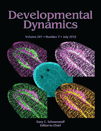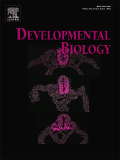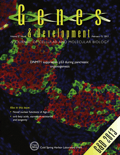
Journal of Developmental Biology
Scope & Guideline
Advancing the Frontiers of Developmental Science
Introduction
Aims and Scopes
- Molecular Mechanisms of Development:
The journal frequently publishes research exploring molecular pathways and signaling mechanisms that govern developmental processes, such as Wnt, TGF-β, and estrogen signaling. - Comparative Developmental Biology:
It emphasizes studies that compare developmental processes across different species, including model organisms like zebrafish, Xenopus, and axolotl, to uncover evolutionary insights. - Stem Cells and Regeneration:
A significant focus is placed on stem cell biology, particularly how stem cells contribute to development and regeneration, including research on pluripotency and tissue regeneration mechanisms. - Developmental Disorders and Disease Models:
The journal includes studies that address developmental disorders, leveraging various models to understand the underlying genetic and environmental factors contributing to these conditions. - Innovative Methodologies in Developmental Biology:
It showcases novel experimental techniques and models, such as organoids and three-dimensional cultures, that advance the field of developmental biology and regenerative medicine.
Trending and Emerging
- Single-Cell Transcriptomics:
There is a growing emphasis on single-cell transcriptomic analysis to understand cellular diversity and developmental processes at an unprecedented resolution, which is crucial for elucidating complex biological systems. - Neurodevelopmental Studies:
Research focusing on neural development, including the mechanisms of neural crest formation and neurogenesis, has gained traction, reflecting an increased interest in understanding brain development and related disorders. - Regenerative Medicine:
Emerging themes in regenerative biology, including the study of regenerative mechanisms in various organisms, highlight the journal's focus on potential applications in tissue engineering and regenerative therapies. - Mechanobiology:
There is an increasing interest in the role of mechanical forces in development, as evidenced by studies exploring how physical factors influence cellular behaviors and developmental outcomes. - Impact of Environmental Factors on Development:
Research investigating how environmental factors, such as chemical exposure and mechanical forces, affect developmental processes is becoming more prominent, linking developmental biology to ecological and health-related issues.
Declining or Waning
- Classical Embryology:
Research focusing on classical embryological techniques and descriptions appears to be less frequent, possibly as the field shifts towards molecular and genetic approaches that provide deeper insights into developmental processes. - Plant Development Studies:
There seems to be a reduction in publications specifically addressing plant developmental biology, indicating a potential waning interest or a shift towards more animal model-focused research. - Historical Perspectives in Developmental Biology:
Papers detailing historical perspectives or the evolution of developmental biology as a discipline are less frequently published, suggesting a move towards more contemporary research themes and practical applications.
Similar Journals

FOLIA BIOLOGICA
Advancing Biological Insights Since 1961FOLIA BIOLOGICA, published by Charles University Prague, First Faculty of Medicine, is an esteemed academic journal that has been contributing to the fields of Biochemistry, Cell Biology, Developmental Biology, Genetics, Immunology, and Molecular Biology since its inception in 1961. With an ISSN of 0015-5500, this journal serves as a vital platform for researchers and professionals to disseminate their findings and advance knowledge within these disciplines. Despite its current Category Quartiles ranking in the lower tiers (Q3 and Q4), FOLIA BIOLOGICA continues to provide valued insights and foster scholarly dialogue, particularly in its paralleled fields. The journal is headquartered in Prague, Czech Republic, and operates without Open Access options, which emphasizes its focus on curated, peer-reviewed content essential for academicians and students. By bridging theoretical and practical knowledge, FOLIA BIOLOGICA remains committed to enriching the scientific community and serving as a cornerstone for future research innovations.

DEVELOPMENTAL DYNAMICS
Pioneering Insights into Developmental ProcessesDEVELOPMENTAL DYNAMICS is a prominent journal in the field of Developmental Biology, published by WILEY. This esteemed journal, identifiable by its ISSN 1058-8388 and E-ISSN 1097-0177, provides a critical platform for the dissemination of innovative research covering cellular and developmental processes across diverse biological systems. With a 2023 impact factor placing it in the Q2 category of Developmental Biology and an impressive Scopus rank of #39/82, the journal plays a vital role in advancing knowledge and fostering collaboration among researchers, professionals, and students. Although it is not an open-access publication, DEVELOPMENTAL DYNAMICS remains a cornerstone in the academic community, particularly for those dedicated to understanding the complexities of biological development. The journal's convergence from 1992 to 2024 reflects its longstanding commitment to high-impact research that influences both theoretical and practical applications in the field.

Annual Review of Cell and Developmental Biology
Connecting Researchers to the Latest in Cell and Developmental BiologyThe Annual Review of Cell and Developmental Biology, published by Annual Reviews, stands as a premier journal in the fields of cell biology and developmental biology. Established in 1995, this influential journal has continuously provided comprehensive and critical reviews that synthesize the latest findings in these vibrant research areas, catering to the interests of researchers, professionals, and students alike. With an impressive impact factor, the journal ranks in the top quartile (Q1) for both Cell Biology and Developmental Biology, boasting remarkable Scopus rankings—#1 in Developmental Biology and #22 in Cell Biology. This emphasizes its significance and authority within the academic community. Although the journal does not operate under an open-access model, it remains a crucial resource for those seeking to stay at the forefront of scientific discoveries and theoretical advancements. The Annual Review of Cell and Developmental Biology continues to solidify its status as an essential platform for sharing knowledge and stimulating scientific inquiry.

Frontiers in Cell and Developmental Biology
Illuminating the pathways of cellular and developmental science.Frontiers in Cell and Developmental Biology is a leading open-access journal published by FRONTIERS MEDIA SA, dedicated to advancing the understanding of fundamental biological processes at the cellular and developmental levels. Since its inception in 2013, the journal has positioned itself as a cornerstone of research in its field, achieving esteemed Q1 quartile rankings in both Cell Biology and Developmental Biology for 2023. With a robust Scopus ranking of #13 out of 82 in Developmental Biology and #67 out of 285 in Cell Biology, it represents a vital platform for innovative research and scholarly discourse. The journal provides a comprehensive and accessible avenue for researchers, professionals, and students alike to share high-quality findings and insights into cellular mechanisms and developmental processes, fostering collaboration and knowledge exchange in the global scientific community. Based in Lausanne, Switzerland, Frontiers in Cell and Developmental Biology is committed to open science, ensuring that all articles are freely accessible to the public, thereby broadening the impact of research in the biological sciences.

EvoDevo
Advancing Knowledge in Evolutionary Developmental BiologyEvoDevo, published by BMC, is a premier open-access journal dedicated to the fields of Developmental Biology, Ecology, Evolution, Behavior and Systematics, and Genetics. With an impressive Q1 ranking in its category for 2023, EvoDevo stands out as a significant resource for researchers, professionals, and students seeking to explore the intricate relationships between evolutionary processes and developmental mechanisms. Since its inception in 2010, this UK-based journal has provided a platform for innovative research and insights, boasting rigorous peer-review standards that ensure high-quality publications. With the E-ISSN of 2041-9139 and a commitment to freely accessible research, EvoDevo is positioned at the forefront of scientific discourse, making vital contributions to our understanding of biological complexities. As the journal converges years from 2010 to 2024, it serves as a cornerstone for knowledge dissemination, inspiring future research trajectories in evolutionary developmental biology.

Open Biology
Unlocking the mysteries of biology, one study at a time.Open Biology is a prestigious, interdisciplinary journal published by the Royal Society that has been paving the way in the fields of Biochemistry, Genetics and Molecular Biology, Immunology, and Neuroscience since its inception in 2011. Catering to a global audience of researchers, professionals, and students, Open Biology operates under an open access model, facilitating the unrestricted dissemination of high-quality research findings. With a current impact factor that positions its categories in the top quartile (Q1) and impressive Scopus rankings—evidencing its influence and reach—this journal serves as a vital platform for innovators and scientific inquiries aimed at advancing our understanding of life sciences. The journal's commitment to publishing cutting-edge research makes it an essential resource for those at the forefront of scientific exploration.

DEVELOPMENTAL BIOLOGY
Charting New Territories in Developmental StudiesDEVELOPMENTAL BIOLOGY, published by Academic Press Inc., Elsevier Science, stands as a pivotal journal in the fields of cell biology, developmental biology, and molecular biology since its inception in 1959. Renowned for its rigorous peer-review process, this journal serves as a platform for publishing cutting-edge research, reviews, and insights that drive forward our understanding of developmental processes at the cellular and molecular levels. With an impressive track record, it is classified in the Q2 quartile across multiple categories, reflecting its significant impact and relevance in academia and research communities. Although the journal does not provide Open Access options, it remains accessible via numerous academic databases, ensuring a wide reach for researchers, professionals, and students alike. With a commitment to advancing the field, DEVELOPMENTAL BIOLOGY continues to be essential reading for those looking to stay at the forefront of developmental research and its applications.

Cells & Development
Bridging Basic and Applied Science in DevelopmentCells & Development is a premier journal published by Elsevier, dedicated to advancing the field of Developmental Biology. With an ISSN of 2667-2901 and an impressive Q2 ranking in its category for 2023, the journal endeavors to provide a platform for high-quality research articles that explore cellular mechanisms, developmental processes, and molecular interactions that underpin growth and differentiation. Based in the Netherlands, Cells & Development not only emphasizes the importance of innovative experimental approaches but also encourages interdisciplinary contributions that bridge the gap between basic and applied science. As an Open Access publication, it ensures that research findings are readily accessible to a global audience, significantly enhancing visibility and impact. The journal's commitment to scholarly excellence makes it an essential resource for researchers, professionals, and students aiming to contribute to the dynamic field of developmental biology.

GENES & DEVELOPMENT
Empowering Researchers with Cutting-Edge Genetic DiscoveriesGENES & DEVELOPMENT, published by COLD SPRING HARBOR LAB PRESS, stands as a premier journal in the fields of Developmental Biology and Genetics, boasting a remarkable impact factor that reflects its prestigious position in the academic community—ranking Q1 in both disciplines as of 2023. Since its inception in 1987, this journal has been at the forefront of disseminating cutting-edge research, effectively bridging the gap between laboratory breakthroughs and their applications in health and disease. Researchers and professionals rely on GENES & DEVELOPMENT for its rigorous peer-review process and its commitment to promoting innovative studies that unravel the complexities of gene functions and developmental processes. With Scopus rankings placing it in the top percentile among its peers, this journal serves as a vital resource for students and established scientists alike, aspiring to expand their knowledge and contribute to the ever-evolving landscape of genetic and developmental research.

IN VITRO CELLULAR & DEVELOPMENTAL BIOLOGY-ANIMAL
Fostering Scientific Dialogue in Cellular ResearchIN VITRO CELLULAR & DEVELOPMENTAL BIOLOGY-ANIMAL, published by SPRINGER, is a pivotal journal in the fields of cell biology and developmental biology, focusing on in vitro studies that enhance our understanding of animal cellular mechanisms and development. With an ISSN of 1071-2690 and an E-ISSN of 1543-706X, this esteemed journal offers a platform for researchers to present their findings and contribute to the body of knowledge necessary for advancements in biological sciences. As a recognized publication, it holds a 2023 category quartile of Q4 in Cell Biology and Developmental Biology, and Q3 in miscellaneous Medicine, reflecting its competitive position yet inviting critical submissions that can span multidisciplinary approaches. Though currently not open access, it serves as an essential resource for professionals, researchers, and students dedicated to unraveling the complexities of cellular processes in an ever-evolving field. The journal has been continuously published since 1986, signifying its long-standing commitment to fostering scientific discourse and innovation.